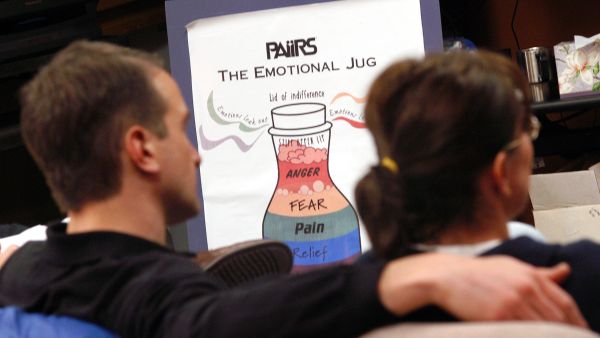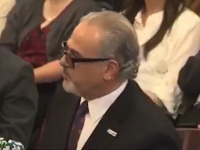Although experts agree that Lebanese now speak more freely about sexuality, they say people from all social and religious backgrounds still lack accurate information.
“I’ve seen highly educated people who don’t know where the vagina is, how to have sex, or, as they say, ‘get the wrong hole,’” says Sandrine Atallah, a clinical sex therapist who describes the situation as “catastrophic.”
Atallah explains that the first thing she does when treating many of her clients is to provide them with basic sexual knowledge. “Sometimes it’s enough to fix the problem,” she says.
Clinical psychologist Brigitte Khoury says that one cause of sexual illiteracy is that the “population matures sexually only within marriage.”
“This creates problems because marriage already carries so much stress and responsibilities,” she laughs.
Sex therapist Maha Nasrallah agrees. “The first time you have sex might be painful but you can learn to relax,” she says.
“It’s not just ‘Use a condom, the penis has to go into the vagina to impregnate her and that’s how you have a baby.’ A bit more [information] than that would be helpful I think,” Nasrallah laughs.
Nasrallah is convinced that sex education must start at a younger age.
“Let’s face it, most kids do have sex, or at least touch each other or themselves. [Talking about it] is not going to increase sexual activity in the country if you teach it the right way with the right values,” she says.
“I’m not saying schools should be telling kids to have sex,” she continues. “I’m saying if they’re going to have sex they’d better have the right information about it.”
At the Social Affairs Ministry, Joumana Jurdi, director of the reproductive and sexual health unit, says that the government has been tackling the issue for many years.
“We’ve addressed youth on the issues of sexual health awareness and sexual diseases around the country, even in very conservative areas,” she says.
She says that more than 1,000 14- 19-years-olds benefit from this service every year.
“We talk about physical and sexual changes, erections, masturbation, wet dreams, puberty, menstruation,” she adds, noting that the ministry also has a website tackling issues related to sexuality aimed at young people.
The unit, which began in 1999, works with schools and community centers affiliated with the ministry, and Jurdi says all community centers now have trained staff to handle issues of women’s sexual health.
She says the main issue now is there are not enough qualified people to provide awareness courses and training.
“In the past, our main challenge was to demystify the issue of sexual health. Now we have many demands from schools and NGOs, but we lack specialists,” Jurdi says.
Khoury, who has trained community center staff on sexual issues, agrees that the situation has evolved.
She’s seen an increase in people turning to her for sexual issues since she opened her practice at the American University of Beirut’s medical center in 1997, and doctors are more aware of sex therapy and refer patients to sex specialists more frequently.
“Twenty years ago, there were no sex therapists in Lebanon,” she says.
Khoury has conducted an anonymous online survey called “Reproductive Health and Sexuality in the Arab World,” whose conclusions will be published soon.
The survey, taken by some 450 Arab nationals aged 18-44, has initially revealed that youth are generally freer when it comes to sex, in the sense that they talk more about it.
“There is a change, of course,” she continues. “Is it enough to say we’re sexually liberal? No, of course not.”
Khoury argues that society still considers many sexual issues taboo and young people are influenced by what their family and religion have to say about their sexual behavior.
Nasrallah also believes sex remains taboo, and women tend to be taken by “social messages” condemning sex.
“I find that women are maybe more influenced by this whole taboo and cultural beliefs about sex, how sex is wrong, taboo and shameful, and we should feel guilty about it,” she says.
Experts agree that the lack of education shapes the kinds of sexual issues Lebanese encounter.
Women who visit a sex therapist in the country often do so because they suffer from vaginism, which is an involuntary contraction of the vagina that prevents penetration.
“We have very high rates of vaginism here and in the region because of lack of experience, lack of education, expectations, who knows … different myths women hear about sex,” Khoury says.
“Their mothers and sisters might say ‘Oh, it’s going to hurt so much, you’re going to bleed so much,’ and they think they’re going to end up in the ER after their first time,” she says.
“I have had many couples who have been married for one or several years and have not been able to consummate the marriage.”
While most women who come to her suffer from vaginism, Atallah says that it’s actually not the most common sexual problem affecting women.
“[Vaginism] is a more pressing demand as it forbids marriage consummation,” she explains, but the most frequent sex-related issue for women is a lack of desire.
“When they lose desire, they find it normal or say they never cared about it or simply don’t talk about it because it’s still too taboo.”
Nasrallah says her clients are often people whose sex issues have a real impact on their lives.
“They’re usually very fed up with their problems and open-minded enough to talk about it.”
When it comes to men, experts agree that the most frequent trouble is premature ejaculation, which according to Atallah represents 30 percent of men’s sexual problems.
She also sees many cases of erection troubles, which she says affect 40 to 50 percent of men over 50 around the world.
Atallah stresses that it’s impossible to get accurate statistics for Lebanon, and that experts’ interpretations are based on their clients only. Even though a large majority of her clients are well-off, she sees people from all social, economic and religious backgrounds, and of all ages.
Atallah recently participated in a 20-episode program on LBC tackling sexuality, which she says was the first such series to air in the country.
The show became a forum for people to ask questions they wouldn’t ask their doctors, related to masturbation, premature ejaculation and penis enlargement, which she notes doesn’t exist.
She says she didn’t feel censored but acknowledges that participants avoided talking about sensitive issues.
“We received a lot of emails about anal sex,” she says, but they didn’t tackle the subject because it’s still not “suitable” to talk about it in Lebanon.
“Sexuality is still forbidden before marriage, contraception is not accepted by religious authorities. We can’t talk about things that are still too taboo,” she says. “It would be like trying to provoke people.”
“When a population is not ready, you need to go step by step,” she says, adding that the show still received many complaints from – mainly Christian – religious authorities.
Nasrallah also stresses the need to be “delicate” when tackling the issue of sexuality. “We don’t want to put up signs … but more doctors should talk about it,” she says.
By Marie Dhumières








